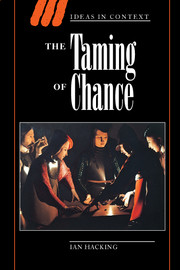Book contents
- Frontmatter
- Contents
- Acknowledgements
- 1 The argument
- 2 The doctrine of necessity
- 3 Public amateurs, secret bureaucrats
- 4 Bureaux
- 5 The sweet despotism of reason
- 6 The quantum of sickness
- 7 The granary of science
- 8 Suicide is a kind of madness
- 9 The experimental basis of the philosophy of legislation
- 10 Facts without authenticity, without detail, without control, and without value
- 11 By what majority?
- 12 The law of large numbers
- 13 Regimental chests
- 14 Society prepares the crimes
- 15 The astronomical conception of society
- 16 The mineralogical conception of society
- 17 The most ancient nobility
- 18 Cassirer's thesis
- 19 The normal state
- 20 As real as cosmic forces
- 21 The autonomy of statistical law
- 22 A chapter from Prussian statistics
- 23 A universe of chance
- Notes
- Index
- Ideas in Context
9 - The experimental basis of the philosophy of legislation
Published online by Cambridge University Press: 05 June 2014
- Frontmatter
- Contents
- Acknowledgements
- 1 The argument
- 2 The doctrine of necessity
- 3 Public amateurs, secret bureaucrats
- 4 Bureaux
- 5 The sweet despotism of reason
- 6 The quantum of sickness
- 7 The granary of science
- 8 Suicide is a kind of madness
- 9 The experimental basis of the philosophy of legislation
- 10 Facts without authenticity, without detail, without control, and without value
- 11 By what majority?
- 12 The law of large numbers
- 13 Regimental chests
- 14 Society prepares the crimes
- 15 The astronomical conception of society
- 16 The mineralogical conception of society
- 17 The most ancient nobility
- 18 Cassirer's thesis
- 19 The normal state
- 20 As real as cosmic forces
- 21 The autonomy of statistical law
- 22 A chapter from Prussian statistics
- 23 A universe of chance
- Notes
- Index
- Ideas in Context
Summary
Paris, 11 September 1831 Criminal statistics becomes as positive as the other observational sciences; when one knows how to stick to established facts, and groups them so as to separate out merely accidental circumstances, the general results then present such a great regularity that it becomes impossible to attribute them to chance. Each year sees the same number of crimes of the same degree reproduced in the same regions; each class of crimes has its own particular distribution by sex, by age, by season … We are forced to recognize that in many respects judicial statistics represent a complete certainty.
Inserted in 1832 We are forced to recognize that the facts of the moral order are subject, like those of the physical order, to invariable laws.
By 1830 innumerable regularities about crime and suicide seemed visible to the naked eye. There were ‘invariable’ laws about their relative frequency by month, by method, by sex, by region, by nation. No one would have imagined such statistical stabilities had it not been for an avalanche of printed and public tables.
The model was set by the annual Recherches statistiques sur la ville de Paris et le département de la Seine. I say ‘annual’ — it took a while for the administration to work smoothly, and the early volumes were usually late. In due course the national ministries extended and made redundant most of the statistical work of the capital. National volumes appeared regularly and efficiently from justice, education and the like. Paris and Seine served as their model.
- Type
- Chapter
- Information
- The Taming of Chance , pp. 73 - 80Publisher: Cambridge University PressPrint publication year: 1990



